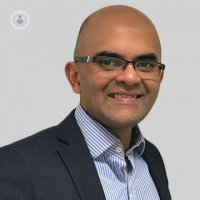Exercising after hernia surgery: what helps and what do avoid
Autore:You’ve just had surgery to repair a hernia – what now? Are there any exercises to avoid, and how long will it take to get back to normal? We asked esteemed consultant general surgeon Mr Himaz Marzook:

Why do you need to be careful with exercise after hernia surgery?
You have to be careful after surgery because the hernia is stitched, so we don’t want the stitches to be ripped. The entire repair depends on the stitches until everything heals and the mesh disintegrates. If the stitches give way, the repair can break down.
The mesh will take about 4-6 weeks to integrate with the body. Once the mesh is properly integrated, it gradually becomes more stable over time. So while it’s important to be careful in the first few weeks after hernia surgery, in the long term you should be able to return to normal activity levels.
Are there any specific exercises to avoid?
You should avoid exercise for a week after surgery. After this period, and while the wound continues to heal, the main exercises are:
• lifting anything over the weight of 10kg
• abdominal crunches (avoid these for 6-8 weeks after surgery)
You can do any other exercise that you feel comfortable doing. Listen to your body, and if you feel comfortable, you can do it.
There is no specific exercise advice for certain types of hernia – the same advice applies whatever hernia you have.
When can I return to work?
Some kinds of work involve more physical activity than others. Whatever your profession, I would advise taking two weeks off hernia. Depending on what kind of work you do, ease back into work more gradually, and discuss with your employer what they can do to facilitate your return.
Some patients ask whether jobs that involve kneeling and crouching are harmful during hernia repair. The answer is that these types of jobs are perfectly fine and shouldn’t impede your recovery.
What problems should I watch out for?
The most dangerous potential complication is where the lump comes out and doesn’t reduce, becoming very tender and painful. That means the lump is strangulated, and this means the blood supply has been cut off, requiring emergency treatment.
The other situation is where the hernia gets obstructed. If the hernia is obstructed you are likely to experience vomiting and will need an emergency operation.
Finally, if the hernia causes pain from pressing on the nerves in the groin or if it gets bigger, you will need to get it looked at by the surgeon for further treatment.
Do not hesitate to book an appointment with Mr Himaz Marzook if you're worried about your hernia.



